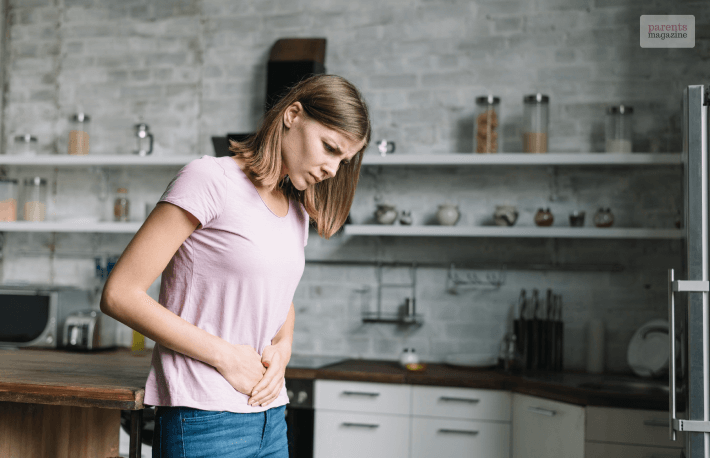
Ovulation Bloating: Is That A Real Thing?
Well, bloating is frustrating, and the feeling is mutual. You are not alone if you find it difficult every month to pull your pants up along with an uncomfortable tightness around the midsection. This is not just an unpleasant feeling, but it also has a way of impacting your self-confidence, as your stomach sticks out because of bloating. The bloated belly looks a lot like a pregnancy bump.
There are many women who have their way of predicting when they are going to get bloated, like clockwork every month. This happens because ovulation makes you feel bloated because of the clever hormone transformations that go on during the menstrual cycle.
What is bloating?
Bloating is quite uncomfortable, amd sometimes painful and sore, whenever you feel pressure in your abdomen. It can also come along with gas. All of these together can cause stomach bloating. Your stomach can feel ballooned up, and the skin can also feel tight.

It is quite common to confuse bloating with water retention. But these are completely different things. Hormonal bloating, in general, is a gassy feeling and happens because of increased pressure. If the swelling is because of water retention, then it is not just the stomach that swells but other parts of the body as well, making you feel heavier and larger than usual. But this doesn’t cause tummy gurgles, gassiness, or a pressure increase.
Bloating can happen because of many reasons. For some women, it is the hormones that trigger bloating, and some know that consuming certain foods would make them bloat. And some get to experience both.
Is it normal to be bloated during ovulation?
It is completely normal to experience bloating while you are ovulating. During this time, the body goes through various hormonal changes. The level of oestrogen and luteinizing hormones increases before ovulation starts, and these have a tendency to bloat your stomach.
But ovulation bloating reduces within a few days. But often, the bloating persists longer than usual because of some medical issues like PCOS or polycystic ovary syndrome, ovarian cysts, or endometriosis. In that case, it is important to consult with a doctor to rule out those points and make sure it is just ovulation bloating.
When you are ovulating or during the menstrual cycle, some women crave some comfort food, like chips, crisps, and takeaways. Even though these foods can console you, they have a very high content of sodium, which is going to increase the bloating.
How long does ovulation bloating last?

Bloating mostly happens during the time of ovulation. According to Dr. Allison Rodgers, reproductive endocrinologist, obstetrician, and gynecologist, Fertility Centers of Illinois, Illinois, US, this feeling is different for all.
She says, “Some people have no bloating and cramps during ovulation at all, some people notice it mainly the day before and day of ovulation, and some people feel bloated from the time they ovulate, until they get their next menstrual cycle.”
How can you differentiate between ovulation bloating and premenstrual bloating?
The most common and easy way to know whether it is ovulation bloating or premenstrual bloating is by tracking the menstrual cycle. Premenstrual bloating comes before one week of menstruation and just after ovulation.
Ovulation bloating comes right in the middle of the cycle, mainly a few days before ovulation actually starts. Premenstrual bloating brings some more signs with it. Those are:
- Nausea
- Tiredness
- Irritability and mood swings
- Tender breasts, swollen
- Headaches
- Diarrhea or constipation
- Abdominal cramping
How do you reduce bloating during or after ovulation?

However, there are numerous ways of reducing bloating during ovulation and after ovulation as well. Let’s check what those are:
Exercise
Sluggish digestion is a reason behind bloating when you are ovulating. But do not stress about it and do some exercises. That would help you get the thing moving and, in return, decrease bloating.
Relaxation
High stress levels can also increase the level of acid in your stomach, which increases the chance of ovulation bloating, as it creates a storm. Take some time out and relax when it is time to start ovulating. Take an aromatherapy bath, a yoga class, a massage, go for a run, or take an art class. Choose what helps you relax.
Probiotics
Studies show that Bifidobacterium lactis and Lactobacillus acidophilus help in improving bloating symptoms. Look for those supplements that have at least one billion CFUs for the live strains to get an optimum result.
Diet
Sometimes, bloating also happens because of food intolerances. It is better if you limit the intake for the FODMAPs group of foods. It stands for fermentable oligosaccharides, disaccharides, monosaccharides, and polyols.
These foods also include artificial sweeteners, lactose, and wheat. Intake a lot of water, and along with that, reduce your salt intake to prevent water retention. This increases the swelling that has happened because of ovulation bloating.
Potassium and magnesium
Eating foods that are rich in magnesium and potassium, like kale, sweet potatoes, bananas, spinach, avocados, and tomatoes, helps in reducing ovulation bloating. The reason behind this is that when there is a lack of magnesium and potassium in the body, it holds onto the salt and excess water.
Bloating should not restrict you from doing your day-to-day activities. It is simply annoying and could turn into a self-conscious person. Mostly, you have to try and adjust to the lifestyle and improve certain things to get things back on track. However, if you are feeling bloating, and it is not reducing, then it is important that you consult a doctor immediately to check if there is any underlying issue.
When to consult a doctor

However, ovulation bloating does not require any medical treatment. But according to Dr. Rogers, “If it is preventing you from doing your usual activities, waking you out of your sleep, or preventing you from being able to have sex … [then] these are reasons to see your doctor.” They will communicate through the symptoms, get some tests done if needed, and then come up with a plan of treatment.
YOU MAY ALSO LIKE:
Already have an account?
Sign In
Create your account
User added successfully. Log in









